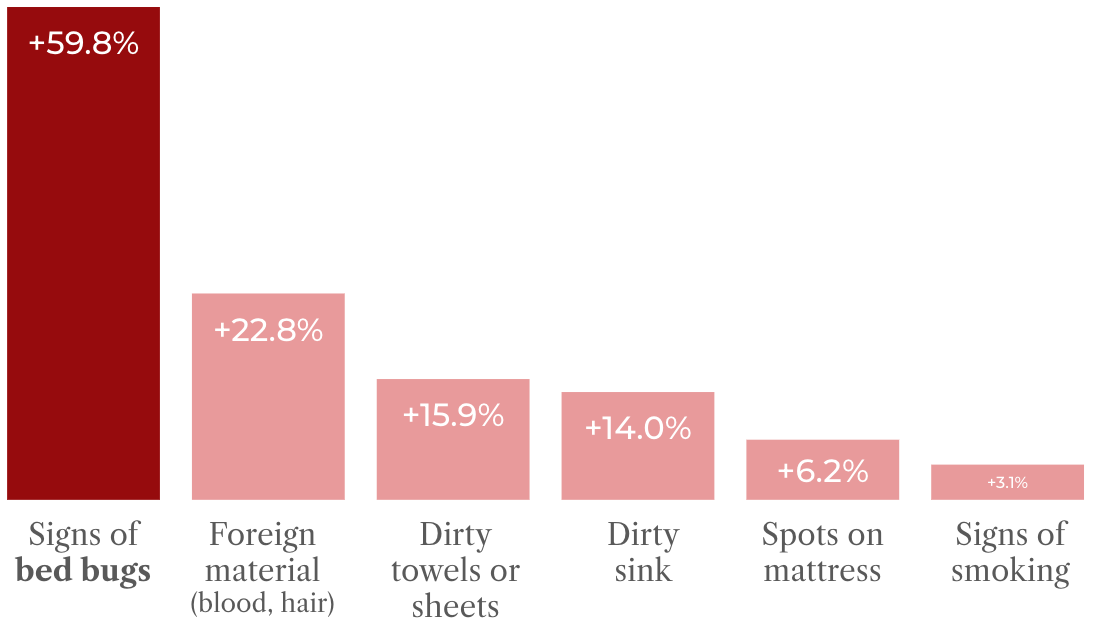Hospitality and bed bugs
The more people come and go, the higher the chances that one of them will bring bed bugs in their baggage. Being constantly at risk of getting bed bugs is the fate of hotels and other vacation rentals all around the globe, no matter their location or standing. As international travel continues to grow, so does the risk! Hotel managers are understandably keeping their bedbug problems to themselves, and it is hard to estimate how big the problem is worldwide. However, a survey by Orkin, one of the leading pest control companies in USA, found that more than 80% of USA hotels were treated for bed bugs in 2016. Another survey reported that 14% of Americans had encountered bed bugs in a hotel in 2023.
What makes a guest change hotels?
In this study, scientists Jerrod Penn and colleagues asked USA hotel guests how they would likely react to various unpleasant findings in their rooms. As you can see below, signs of bed bugs was by far the most likely to cause them to leave! Even more worrying, 9% of respondents reported that they would likely press charges if they ever found a bed bug and 47% that they would report it on social media.

Percentage of USA hotel guests reporting that they would likely change hotel following various unpleasant findings in their room. Adapted from J.M. Penn et al (2017) Bed Bugs and Hotels: Traveler Insights and Implications for the Industry, American Entomologist 63(2) 79-88 (Read more about the study).
The cost of bed bugs
In 2020, the president of Paris region hospitality industry estimated a cost of 1500€ per room on average, just for treatment. But that cost may go much higher if one includes furniture replacement and lost business. Especially so in the age of social media, where damage to a hotel’s reputation can reach far and wide. In the USA, the average all-inclusive cost was $6,383 in 2017 according to Orkin. Even worse, the cost could skyrocket to an average $23000 if affected guests chose to litigate.
What if I just close the room and wait?
In a best case scenario, that wouldn’t solve the problem. In this scientific study, bed bugs marked and released again in an empty apartment could still be found alive more than 4 months later. The record of bed bug survival in the absence of host even goes up to a year. Worse, the infestation may spread while you wait! In the same study 5% of all marked and released bed bugs were captured again next door.
What do I do about bed bugs in hotels as an owner?
Bed bugs in hotels are common. This is a result of an increased risk when many people pass through a place.
Even if you haven’t had a bed bug infestation yet, it’s only a matter of time.
Proactive efforts and a ready plan to handle affected guests are crucial…
What do I do about bed bugs in hotels as a guest?
At arrival, leave your bag in the entrance and carefully check your room, especially the bed.
Look for dark stains, blood spots or live bed bugs and their remnants on the bed, along mattress seems, behind the headboard…
Are bed bugs common at Airbnb homestays?
Bed bugs can be present in any accommodation, including Airbnb rentals.
Like hotels and hostels, Airbnb properties experience high turnover of guests, which means there always is a chance that someone unknowingly brings bed bugs with them, leading to an infestation.
Airbnb hosts can help minimize the risk of bed bugs by…
Should I be worried about bed bugs on planes?
Hundreds of humans seated for hours inside a metal box with almost no elbow room, lots of dark, hard to access corners, this sounds like a bed bug paradise!
Airplanes are an ideal place for bed bugs to thrive and very challenging to treat. While avoiding encounters is nearly impossible, there are steps one can take to avoid bringing them home.
